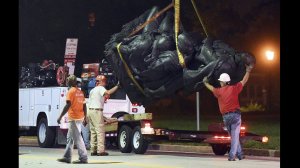The section of a Baltimore park that once hosted a Confederate monument was rededicated on Saturday in honor of famed abolitionist Harriet Tubman.

A tree-filled area of Wyman Park Dell, near Johns Hopkins University, was renamed the Harriet Tubman Grove as part of a ceremony marking the 105th year since her death. Residents gathered in the park on Saturday to celebrate her life and the renaming of the grove.
“It helps bring the community values to important places and helps to weave together the community,” Baltimore Councilwoman Mary Pat Clarke said, according to CNN affiliate WJZ. “This place is really interesting. Since the statues were removed, it has become a gathering place.”
The Harriet Tubman Grove was previously the site of statues for Confederate generals Robert E. Lee and Thomas J. “Stonewall” Jackson. In August, Baltimore removed four Confederate monuments from Wyman Park Dell in the wake of the violent white nationalist rally in Charlottesville, Virginia.
The memorials removed included the Lee and Jackson statues, a monument dedicated to Confederate women, and a monument to Roger B. Taney, the Supreme Court justice who wrote the opinion in the Dred Scott case.
Mayor Catherine Pugh later defended the decision to remove the memorials quickly in the middle of the night.
“I felt the best way to remove the monuments was to remove them overnight,” Pugh said. “I thought that there’s enough grandstanding, enough speeches being made, get it done,” she said, adding that the decision to relocate the monuments “shouldn’t be a debate that’s gripping this city.”
Tubman was born into slavery in Maryland, escaped to freedom and then became a “conductor” on the Underground Railroad, helping other slaves escape to safety. During the Civil War, she also worked as a spy for the Union Army, and later advocated for women’s right to vote.
Friends of Wyman Park Dell, a nonprofit organization that supports the park, wrote a letter to the City Council in October welcoming the renaming.
“This dedication of a grove of trees seems a fitting honor for a great abolitionist and US Army spy who traveled countless miles through Maryland forests,” wrote C. Ryan Patterson, the president of the group’s board of directors.
The proposal also “provides the city an opportunity to correct a historic injustice for a Maryland native. Our city has not yet properly recognized Harriet Tubman, who died in poverty,” Patterson wrote.

























